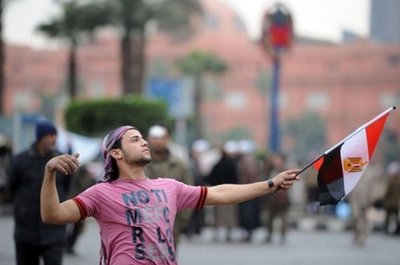Some Thoughts on What Social Media Can – and Can’t – Accomplish
There aren’t many things one can rely on these days. One of the few is finding something thoughtful, or provocative, or just plain interesting in Foreign Policy magazine.
Now, before you discount this as little more than a plug from one journalist to another, consider for example that in just the last week or so, FP asked whether supercomputers will ever be able to predict revolutions (yes, but not yet), assembled a slide show of Russian Prime Minister Vladimir Putin doing…well, just about everything (he drives race cars! and shoots bears!), and delivered a sharp-elbowed look at Abkhazia’s pursuit of independent statehood.

A protester in Cairo's Tahrir Square
What caught our eye, however, was managing editor Blake Hounshell’s recent reflection on social media and the Arab Spring titled, “The Revolution Will Be Tweeted.” (Yes, we’ve used that title before, too; but so have many others.)
Hounshell writes he was moved to re-think social networks like Twitter during a recent visit to Egypt. Following a large and angry crowd to Tahrir Square, Hounshell’s eye fell on several young Egyptians. “To one side stood a different category of rebel entirely: scruffy guys and gals staring down at their cell phones. They were tweeting.”
He goes on to describe Twitter less as a social network and more a reporter’s medium – similar to the old ‘wire’ that used to connect newspapers and bureaus around the world. “Twitter isn’t the maker of political revolutions, but the vanguard of a media one,” he writes.
We caught up with Hounshell and put a few questions to him about Twitter, revolutions, and journalism. Some excerpts – first on the role of social media in the Arab Spring:
“I think some people are a little too excited about the impact of Twitter and overestimating the impact that this technology and other types of social media have had. And then I think some people go too far and dismiss it altogether. Clearly, social media has had some kind of effect. But I don’t think we really can say, with confidence, whether the Arab Spring would have happened without it. Going back to the 1800’s, 1700’s, a lot of revolutions happened without social media. People tend to communicate with whatever is the most expedient and convenient, and I think that’s the case now.”
On what social media has done effectively:
“There’s no question that social media has allowed some space for activists and ordinary people to organize, share their grievances, complain about the government; and it’s also helped I think in that moment of revolutionary upheaval. What it does is it politicizes people who might have used Facebook to share pictures of their family and their cats. If there’s one person in their network of friends who’s uploading pictures of people being shot while protesting, they’re gonna see that. And in a lot of cases it’s going to motivate them to go out on the streets themselves.”
And on the dangers of relying on Twitter:
“It’s certainly true that governments, especially in the Middle East, are going to try to co-opt social media for their own ends. I think most of them realize they can’t shut things down – for instance in Bahrain, there were hundreds of very mysterious accounts on Twitter that popped up when the violence was in full bloom there. These were Twitter accounts that seemed to be towing the government line and denouncing the protesters as agents of Iran and so forth. And once things died down in Bahrain, about 25% of the country’s Twitter users suddenly disappeared. So it looked very suspiciously like someone was trying to manipulate the story line. For Western reporters, we tend to filter out that kind of thing. What can be more dangerous is when you have a polarized like Bahrain or like Syria, people believe what they want to believe. “
You can listen to our complete interview here:
